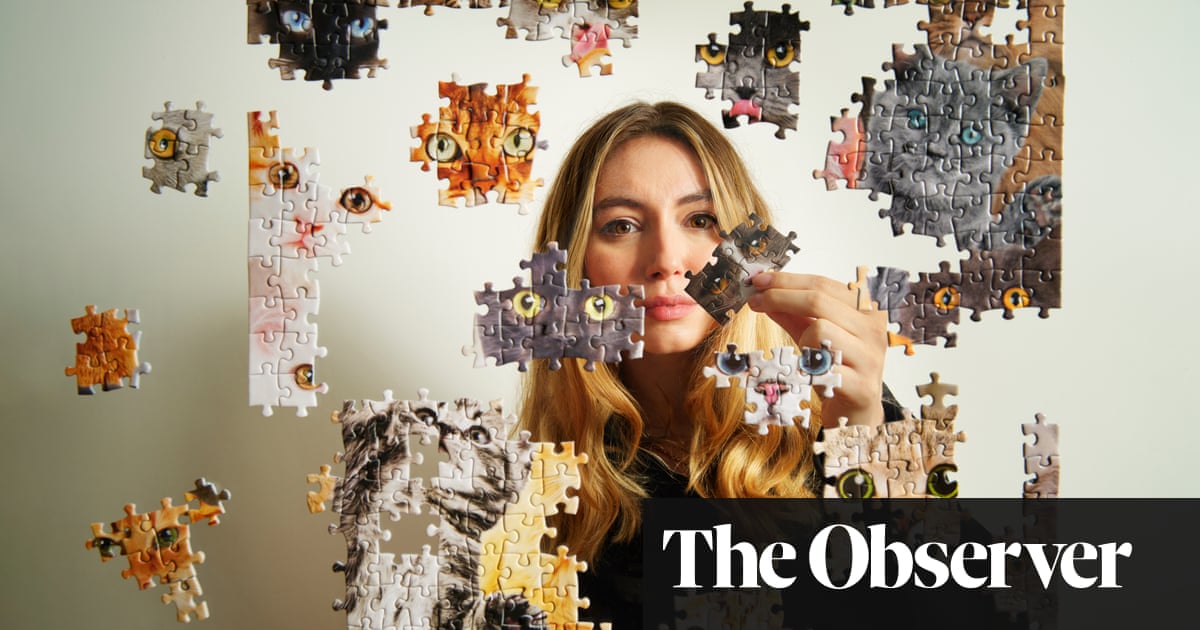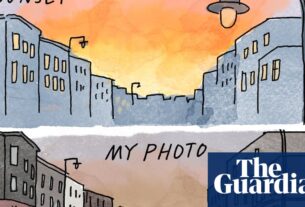Are you here for the puzzle championship?” asks a smiling fellow competitor as I join the queue of puzzle enthusiasts. I most definitely am. But my smile drops as she continues: “That’s all the niceness you’ll be getting from me today, then.” She is, of course, joking but, as with most jokes, there is a glimmer of truth behind it.
I am in Newmarket, Suffolk, for the Gibsons British Jigsaw Championship, which has been held here for the past 11 years. Competitors battle it out to be in with a chance of the £100 first-place prize money. There are three categories: Fun, Pairs and Elites, who would expect to complete a 1,000-piece puzzle in under three hours. In 2023, Elite nine-time British champion Sarah Mills finished her puzzle in 1 hour 52 minutes, meaning she was doing a jaw-dropping eight pieces per minute.
Six months earlier, and without having done a puzzle for more than 10 years, I had naively decided there was nothing greater than a challenge and signed up to the Elites competition. I figured that six months would be enough training to be in with a chance; I mean it’s only a 1,000-piece puzzle – how hard could it really be?
It’s estimated that £24m-worth of puzzles were sold in the UK during 2022. This is projected to grow 3.21% by 2028. As I scour the internet in search of puzzles, I am struck by how expensive they are. Some people say you can’t put a price on fun, but with an average of £15-£20, I end up turning to secondhand sellers flogging them for about £5 instead.
I settle on a 500-piece 1970s sweets-themed puzzle and am instantly flooded with nostalgia, transported back to when I was eight and my grandma and I would share a tray on our lap as we puzzled together. I put on a timer and order myself a pizza, but it soon goes cold as I lock in. It takes me four hours and I am elated.
Janet Ramsay-Helie has organised the competition since it began. She got the idea when a friend came back from a holiday on the Isle of Wight and told her all about a puzzle competition. Figuring they had nothing to lose, they decided to give it a go and put on their own in Newmarket. Over the years, the competition has become so big that, last year, they had to hold it in three separate halls. Competitors arrive from all over the world. I assume Janet must be a puzzle master herself, but she confesses: “I don’t do them. Actually, that’s a bit of a lie. I do them occasionally, but if I start one, I find it difficult not to finish. I haven’t got the time to sit and do it like that, I get lost in it. I used to do them and found it was one or two o’clock in the morning.”
I practise by doing a puzzle a week, flowers, maps of London and animals; but cats soon become my arch enemy. Initially I had been drawn to their cute faces, submerged within whimsical floral baskets or playing with balls of wool. Quickly, I realise that an image of 15 cats with almost identical colourings and faces is what my puzzling nightmares are made of. Three days into my first ever 1,000-piece puzzle I finally have to give up, unable to distinguish between five white kittens.
Just a few days after my disastrous attempt, I catch a woman dumping a bag of rubbish in my front garden. I ask her to take it with her, but she runs off shouting: “Have it – it’s free!” Baffled, I open the bag to find four 1000-piece cat puzzles inside. In what seems like a bizarre prank from the universe, it reminds me to keep pushing through my fear of cats.
While most people suggest starting with the edges, this is not Mill’s technique. “I start with colours. I start sorting through the pieces and pull out the big patches of colour. A lot of people like having the edges as a frame. But I’m more about putting areas together, if I have a frame it gets in the way.”
In 2019, Sarah also competed in the world championship in Spain and came fourth, but even she gets nervous about the British championship. “The adrenaline kicks in, though, doesn’t it? So I just sort of focus on what I’m doing and try not to think about everyone else.”
The British event is run by volunteers. Janet explains that once first, second and third place has been established in each category, they don’t rank participants past that. “We have people that feel it doesn’t seem very fair as they are travelling a long way to compete, but you’ve got to realise that some take six hours to finish. We haven’t got the people to wait around for a few competitors to make it to the end,” she explains. I gulp, praying that I finish faster than six hours.
Come 23 June, I try to stay in the “weirder things have happened” mindset when thinking about my chances of winning. I walk into the Rowley Mile racecourse and am overwhelmed by the number of competitors. I pass a pair setting up an easel-like structure, hundreds of colour-sorting boxes, people in matching hats and T-shirts, people wearing noise-cancelling headphones and bringing out scissors – to save time picking the sticker-seal off the box to open it. I look glumly at the simplicity of my own set-up and wonder if it will be my downfall, before remembering that Sarah doesn’t have any tools either. If it’s good enough for the British champion, it’ll be good enough for me.
The puzzle makes me nervous; it’s a scene made up of 28 faces at a puzzle festival. Although incredibly apt for the competition, the thousands of tiny puzzle boxes and picture frames with similar images look tricky. There are a lot of very similar colours and patterns and I know how much of a nightmare this will be. The gentle whisper of people talking strategies floats through the room like a ghostly echo and I hear rustling from tables around me as competitors bring out sweets, flasks, biscuits and sandwiches.
A very intense-looking competitor walks past my table before softening and giving me a comforting “good luck” nod. He approaches his table, just before Janet announces over the Tannoy that the competition is about to begin. There is a gentle murmur among the competitors while they press record on their phones, which are placed on bird’s-eye-view tripods. “We will count down from five and then the puzzle will commence,’’ Janet booms. The frantic sound of thousands of puzzle pieces being tipped out and sorted reverberates around the room as she shouts: “Go!”
An hour in, I hear a commotion as one couple hiss they are missing three pieces. They scramble around on the floor briefly before shouting “finished” and sealing their fate with a kiss. After just 1 hour and 5 minutes, veterinarian couple Peter and Nikki Thomas are the first to finish in the Pairs category. Just nine minutes later, Sarah, who looks as relaxed as someone on a beach holiday, also shouts “finished”. I’ve barely done a quarter by the time most are nearly done.
Three hours in, those around me have gone to get lunch as they’ve completed their puzzle and all winners have been declared. “Keep going,” says one person with a thumbs up. My back is burning from craning over the table and no amount of stretching is easing the pain. By 2pm I have to stop as I haven’t finished and the awards are being handed out.
As I approach the crowd for the trophy ceremony, I meet the Pairs winners and introduce myself, sheepishly chuckling about how hard I found it and congratulating them. “You completed it, though, and that’s something to be proud of,” Peter Thomas says. I burst into hysterics as I explain I hadn’t actually finished it. “At least you had fun,” he grimaces.
The Thomases have an infectious enthusiasm for jigsaw puzzles. They both enjoy doing them to relax and will often debate about who has the better technique. In autumn 2022, while on holiday, they joked that if ever there was a puzzling competition, they would enter it. After watching YouTube videos, they discovered speed puzzling and their competition days began. “We didn’t really know what we were doing when we entered in 2023.”
They came second in the British championship and decided to then enter the 2023 world championships in Spain, where they came 60th.
Their strategy is simple: split the puzzle into two lines, each person tackling different areas. Peter constructs the puzzle upside down and Nikki is in charge of faces. They are now forming a team to go to the world championship again in Spain later this year, hoping to rank at least 30th. “We’ve met lots of people, the community is amazing. It’s full of friendly, brilliant folk.”
I feel a glimmer of hope. Maybe one day I can train long enough to join a team? “I think no one can really break into that top 10 by training. You’ve either got it or you haven’t, but I do think you can train and get marginal gains,” says Peter. To them, the people who “have it” seem to have their main skillset in organisation, dexterity and pattern recognition.
When I get outside, people are busy with puzzle swaps out of their car boots and it feels like the perfect example of the sense of community that grows from doing puzzles and why, perhaps, more of us might benefit from taking it up. For me, I’ve found joy in reconnecting with a hobby I did all those years ago with my grandmother and that’s a memory more precious than coming first in a competition.



